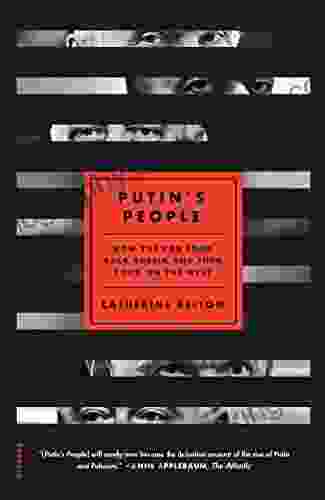How The Kgb Took Back Russia And Then Took On The West

4.5 out of 5
| Language | : | English |
| File size | : | 33971 KB |
| Text-to-Speech | : | Enabled |
| Enhanced typesetting | : | Enabled |
| X-Ray | : | Enabled |
| Word Wise | : | Enabled |
| Print length | : | 642 pages |
| Screen Reader | : | Supported |
Unveiling the Shadow War that Redefined Global Politics
In the aftermath of the Cold War, as the Soviet Union crumbled and the world Free Download entered a period of flux, one organization quietly began to reassert its power and influence: the KGB. Through a combination of espionage, covert operations, and strategic manipulation, the KGB orchestrated a remarkable resurgence of Russian power, setting the stage for a global confrontation with the West.
In this captivating book, renowned investigative journalist and security expert Matthew Harding unveils the untold story of the KGB's resurrection and its far-reaching implications for international security. Based on meticulous research, Harding provides an insider's account of the KGB's clandestine operations, tracing the evolution of its strategies from the shadows of post-Soviet Russia to its current role as a formidable adversary in the geopolitical arena.
The KGB's Rise from the Ashes
Following the collapse of the Soviet Union, the KGB faced an uncertain future. Its budget was slashed, its personnel reduced, and its reputation tarnished by the failures of the communist regime. However, within a decade, the KGB had managed to rebuild its strength, becoming a formidable force once again. Harding reveals how the KGB exploited political instability and economic chaos to infiltrate key institutions and regain its influence within the Russian government.
Central to the KGB's resurgence was the strategic alliance forged between its leadership and Vladimir Putin, who rose to power in the late 1990s. Putin, a former KGB officer himself, understood the value of intelligence and security apparatus in maintaining control and projecting Russian power abroad. Under Putin's leadership, the KGB was granted unprecedented authority, its budget expanded, and its operations extended far beyond Russia's bFree Downloads.
Espionage, Disinformation, and Cyberwarfare: The KGB's Arsenal
As the KGB regained its footing, it began to deploy a sophisticated arsenal of covert tactics to achieve its objectives. Espionage remained a cornerstone of its operations, with intelligence officers operating around the world, infiltrating foreign governments, and gathering sensitive information. Harding provides chilling accounts of KGB moles embedded in Western intelligence agencies, extracting vital secrets and disrupting operations.
Alongside espionage, disinformation became a powerful weapon in the KGB's arsenal. Harding exposes how the KGB systematically spread false information and propaganda, both within Russia and abroad, to manipulate public opinion, undermine Western credibility, and sow discord. Social media platforms and online news outlets became fertile ground for the KGB's disinformation campaigns.
In recent years, the KGB has also embraced cyberwarfare as a means of projecting its power and disrupting its adversaries. Harding reveals the KGB's involvement in numerous high-profile cyberattacks, including the hacking of Western government networks and the manipulation of elections. The KGB has shown a remarkable ability to adapt to the evolving technological landscape, constantly developing new methods to infiltrate and disrupt enemy systems.
The KGB's Global Ambitions: Targeting the West
As the KGB consolidated its power within Russia, it set its sights on a broader goal: challenging the dominance of the West. Harding argues that the KGB's resurgence was driven by a deep-seated resentment of the West's perceived interference in Russian affairs and a desire to restore Russia's former glory. Through its covert operations, the KGB aimed to undermine Western institutions, discredit its leaders, and sow division within NATO and the European Union.
The KGB's global campaign took many forms. It supported far-right and nationalist movements in Europe, seeking to weaken Western unity and promote anti-Western sentiment. It cultivated close ties with rogue regimes, such as North Korea and Iran, to counterbalance Western influence. And it engaged in strategic disinformation campaigns, designed to erode trust in Western democracies and promote alternative narratives.
The KGB's most overt and aggressive move came in 2014, when it orchestrated the annexation of Crimea from Ukraine. This act of aggression marked a turning point in relations between Russia and the West, leading to a sharp escalation in tensions and the imposition of sanctions on Russia. The annexation of Crimea was a clear demonstration of the KGB's willingness to use force to achieve its political goals.
The KGB's Legacy and the Future of Global Security
The resurgence of the KGB has had profound implications for global security. Its covert operations, disinformation campaigns, and cyberattacks have eroded trust between nations, undermined democratic institutions, and destabilized international relations. The KGB's long-term strategy has been to weaken the West, both from within and without, to create a more favorable environment for Russian influence.
As Harding concludes, the KGB's resurgence is a stark reminder of the enduring power of intelligence and security agencies in shaping global events. The future of international security will depend on the ability of Western democracies to counter the KGB's covert tactics, strengthen their own intelligence capabilities, and promote transparency and accountability. Only by understanding the KGB's methods and motivations can we hope to mitigate its destabilizing influence and ensure a more stable and secure world Free Download.
Matthew Harding's "How The Kgb Took Back Russia And Then Took On The West" is an essential read for anyone interested in the shadowy world of espionage, international relations, and the evolving nature of global security. It is a gripping account of the KGB's remarkable resurgence, its covert operations, and its far-reaching implications for the West and beyond.
4.5 out of 5
| Language | : | English |
| File size | : | 33971 KB |
| Text-to-Speech | : | Enabled |
| Enhanced typesetting | : | Enabled |
| X-Ray | : | Enabled |
| Word Wise | : | Enabled |
| Print length | : | 642 pages |
| Screen Reader | : | Supported |
Do you want to contribute by writing guest posts on this blog?
Please contact us and send us a resume of previous articles that you have written.
 Book
Book Novel
Novel Page
Page Chapter
Chapter Text
Text Story
Story Genre
Genre Reader
Reader Library
Library Paperback
Paperback E-book
E-book Magazine
Magazine Newspaper
Newspaper Paragraph
Paragraph Sentence
Sentence Bookmark
Bookmark Shelf
Shelf Glossary
Glossary Bibliography
Bibliography Foreword
Foreword Preface
Preface Synopsis
Synopsis Annotation
Annotation Footnote
Footnote Manuscript
Manuscript Scroll
Scroll Codex
Codex Tome
Tome Bestseller
Bestseller Classics
Classics Library card
Library card Narrative
Narrative Biography
Biography Autobiography
Autobiography Memoir
Memoir Reference
Reference Encyclopedia
Encyclopedia Carlo Collodi
Carlo Collodi Brian Portnoy
Brian Portnoy Brian Evenson
Brian Evenson Carol Inskipp
Carol Inskipp C S Pacat
C S Pacat Caroline Moorehead
Caroline Moorehead Carl Paoli
Carl Paoli Carl Robertts
Carl Robertts Carol E Williams
Carol E Williams Bruce Hyde
Bruce Hyde Cale Plamann
Cale Plamann Cailin O Connor
Cailin O Connor Carly Findlay
Carly Findlay Caroline Van Hemert
Caroline Van Hemert Brendan Walsh
Brendan Walsh Brigette Tasha Hyacinth
Brigette Tasha Hyacinth Carrie Marie Bratley
Carrie Marie Bratley Catherine Dawson
Catherine Dawson Brian Connell
Brian Connell Brian Ashcraft
Brian Ashcraft
Light bulbAdvertise smarter! Our strategic ad space ensures maximum exposure. Reserve your spot today!

 Derrick HughesUnveiling the Secret Places of Western New York: 25 Scenic Hikes to Ignite...
Derrick HughesUnveiling the Secret Places of Western New York: 25 Scenic Hikes to Ignite...
 Michael ChabonThe Secret History of the iPhone: Unlocking the Origins of a Technological...
Michael ChabonThe Secret History of the iPhone: Unlocking the Origins of a Technological... Billy FosterFollow ·17.3k
Billy FosterFollow ·17.3k Albert CamusFollow ·9.4k
Albert CamusFollow ·9.4k Zachary CoxFollow ·17.5k
Zachary CoxFollow ·17.5k Dylan HayesFollow ·13k
Dylan HayesFollow ·13k Alec HayesFollow ·5.5k
Alec HayesFollow ·5.5k Jedidiah HayesFollow ·13.5k
Jedidiah HayesFollow ·13.5k Leo TolstoyFollow ·19.5k
Leo TolstoyFollow ·19.5k Dominic SimmonsFollow ·19.5k
Dominic SimmonsFollow ·19.5k

 Andy Hayes
Andy HayesUnveil the Rich Tapestry of Rural Life: Immerse Yourself...
Step into the enchanting pages of "Still...

 David Mitchell
David MitchellUnlocking the Depths of Cybersecurity: An In-Depth Look...
In the ever-evolving landscape of...

 Seth Hayes
Seth HayesUnlock the Secrets of Watercolor Landscapes: 37 Tools for...
Embark on a...

 Tyler Nelson
Tyler Nelson15 Insightful Answers to Questions on Uterine Fibroid
Uterine fibroids...

 Evan Hayes
Evan HayesAfrica In My Soul: A Literary Odyssey That Captivates the...
In a world where diverse cultures...
4.5 out of 5
| Language | : | English |
| File size | : | 33971 KB |
| Text-to-Speech | : | Enabled |
| Enhanced typesetting | : | Enabled |
| X-Ray | : | Enabled |
| Word Wise | : | Enabled |
| Print length | : | 642 pages |
| Screen Reader | : | Supported |










